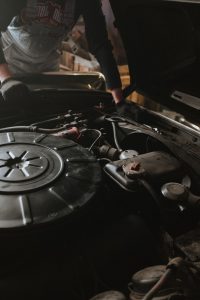How Does Brake Fluid Work?
 The performance of the brakes is probably one of the most important functions in a vehicle. So whether you’re driving a trusty Nissan Altima or a Porsche Panamera, it’s nothing without reliable brakes.
The performance of the brakes is probably one of the most important functions in a vehicle. So whether you’re driving a trusty Nissan Altima or a Porsche Panamera, it’s nothing without reliable brakes.
However, many car owners don’t really understand how brakes and brake fluids work. So for this post, we share information about the braking system and how it works.
What is brake fluid?
Brake fluid is just one of the hydraulic fluids you can find in your car. This fluid is pressurized to ensure efficiency whenever you need to stop the vehicle.
Moreover, brake fluids are available in various types. Here are some of the most commonly used in the automotive industry:
- DOT3. This brake fluid type is the most common among vehicles. It’s important to handle this fluid carefully because it’s highly corrosive. You can also mix it with DOT5.1 and DOT4 types.
- DOT4. The DOT4 brake fluids are popular among European automotive manufacturers. It has reduced water absorption but remains highly corrosive. Also, it’s a polyethylene-glycol type of brake fluid, just like DOT3.
- DOT5. The DOT5 is a silicone-based brake fluid with a much higher boiling point than the first two. It’s efficient but not recommended for vehicles with anti-lock brake systems (ABS). Also, you can’t mix it with other types of brake fluids.
- DOT5.1. While it has a similar name to the previous type, DOT5.1 isn’t silicone-based brake fluid. It’s more similar to DOT4 and can be mixed with both DOT3 and DOT4.
How do brake fluids work?
The braking system of a car is pretty straightforward. Once you press the brake pedal, the brake system will hit a piston that will connect to the master cylinder. From there, the pressurized brake fluids will be propelled to the calipers.
The calipers will press the internal brake pads, which will squeeze the brake rotor. The friction of being clamped down will reduce your car’s speed.
Aside from stopping your car, brake fluids also serve as a lubricant to the braking system’s moving parts.
Take note that all of these steps occur in a split second. This is why you can stop your car in a snap. This is also why you should keep your brake fluids regularly checked and replenished if necessary.
What happens when brake fluid leaks?
If your car’s brake fluid leaks for some reason, it will directly affect the braking system’s efficiency. As a result, there will be less braking pressure, and you won’t be able to stop your car properly. Ultimately, this can lead to road accidents.
How to keep your brake fluids in check
The rule of thumb is to get your brake fluids checked whenever you get an oil change. However, this may not always be necessary unless your car has high mileage.
Moreover, you must ensure that there’s no excessive moisture within the braking system. As mentioned, brake fluids act as a lubricant to the moving parts of the braking system. Brake failure may occur if the fluid absorbs too much moisture from these parts.
Conclusion
Your car’s brake fluid plays an indispensable role in your safety. This is why you should include it on your vehicle routine checks. Investing in your brake fluid’s condition is the same as investing in your safety.
